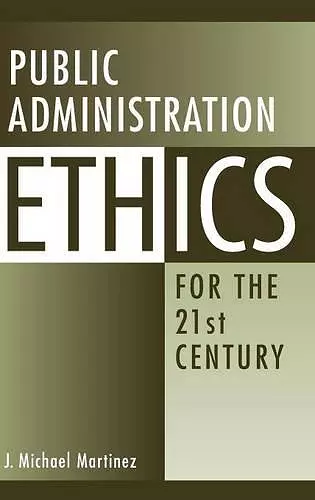Public Administration Ethics for the 21st Century
Format:Hardback
Publisher:Bloomsbury Publishing PLC
Published:10th Aug '09
Currently unavailable, currently targeted to be due back around 30th January 2026, but could change
This hardback is available in another edition too:
- Paperback£16.19was £17.99(9780313358821)

This volume establishes a foundation for a uniform code of professional ethics for public administrators in the United States. Public Administration Ethics for the 21st Century lays the ethical foundations for a uniform professional code of ethics for public administrators, civil servants, and non-profit administrators in the US. Martinez synthesizes five disparate schools of ethical thought as to how public administrators can come to know the good and behave in ways that advance the values of citizenship, equity, and public interest within their respective organizations. Using case studies, he teaches American administrators how to combine the approaches of all five schools to evaluate and resolve complex ethical dilemmas within the constraints of the U.S. democratic values set. Martinez enunciates the common ethical principles that guide public administrators in their practice within the specific ethical parameters and organizational cultures of a myriad entities at the federal, state, and local levels of government in the United States, as well as in non-profit organizations. Along the way, Martinez addresses a number of crucial issues, including personal gain, conflict of interest, transparency, democratic impartiality, hiring, hierarchical discipline, media relations, partisan pressure, appointments by elected officials, and whistle-blowing. The striking, high-profile case studies—Nathan Bedford Forrest, Adolph Eichmann, Lieutenant William Calley, and Mary Ann Wright—illustrate ethical dilemmas where, for better or worse, the individual was at odds with the organization.
For academics and public administration practitioners, Martinez, a corporate attorney who teaches political science at Kennesaw State U., outlines a theory of ethics that does not choose one specific approach to problems but rather focuses on the process of decision making. He describes the history and development of administrative ethics, the strengths and weaknesses of various approaches to administrative ethics, modern ethical theory, including descriptive and normative ethics, the role of the administrator and issues of individual vs. organizational values, and a model of ethics for public administrators that emphasizes a process approach, in which individuals decide on the appropriate content of ethical standards. This final chapter outlines the stages of the process leading to an ethical decision. * Reference & Research Book News *
ISBN: 9780313358807
Dimensions: unknown
Weight: 482g
216 pages